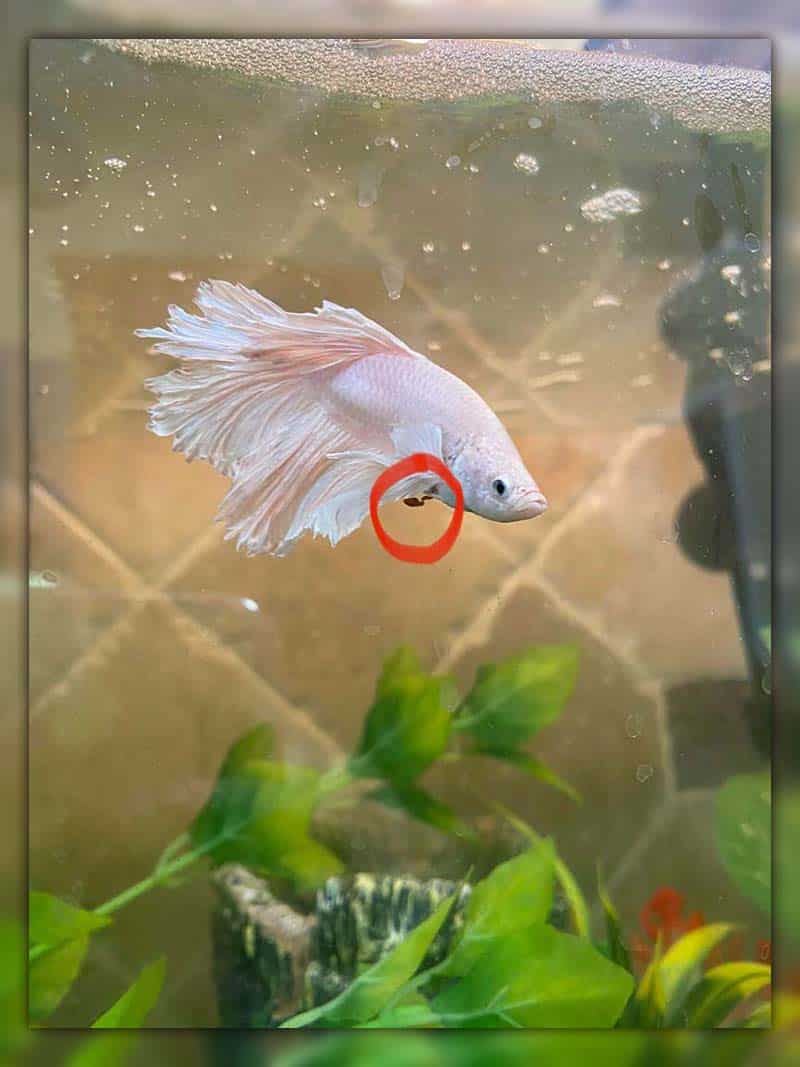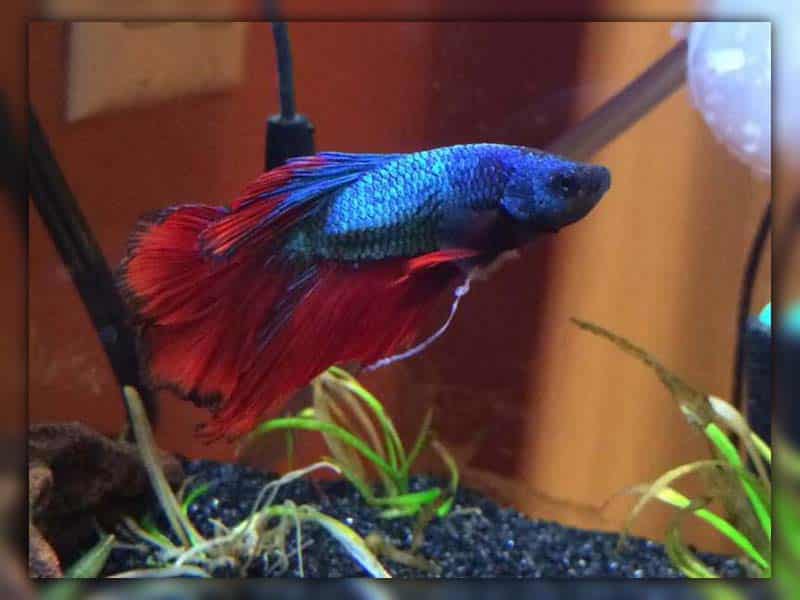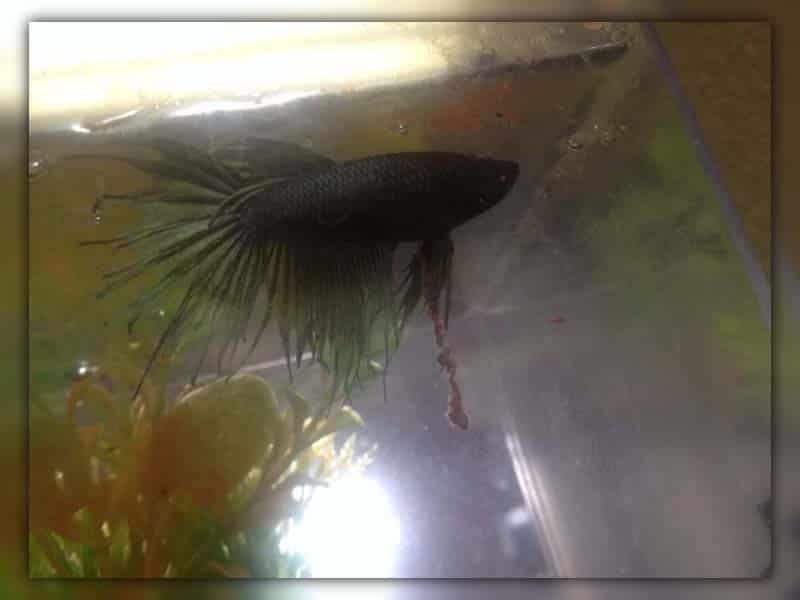Fish poop is an important aspect of fish keeping that is often overlooked. Although it may not be the most glamorous topic, digestive health plays a crucial role in your fish’s overall well-being.
This article offers an in-depth guide to betta fish poop, which can be challenging to identify due to its appearance. Our guide aims to address common questions about betta fish poop, including the frequency of their bowel movements, their preferred toileting spots, the characteristics of their excrement, and what unusual poop or the absence of poop might indicate.
Do Betta Fish Poop?
Yes, betta fish do poop. While you might not catch your betta in the act, over time, you’ll notice small accumulations at the bottom of the tank. These deposits can sometimes be mistaken for uneaten pellets, as betta waste tends to have a more rounded, clumped appearance rather than being long and stringy.
Bettas, with their unique personalities, often seek out private spots for their bathroom breaks. They have a penchant for consistency, typically choosing the same secluded spot—be it among plants or in a quiet tank corner. So, the next time you see your betta nestled in the reeds, they might be taking a moment for themselves in more ways than one!
For those curious about the anatomy, bettas release waste from a tiny opening located just in front of their anal fin. Given its minuscule size, it’s easy to overlook. However, with time, you might spot a little buildup in their chosen restroom area.

What Does Betta Fish Poop Look Like?
Much like humans and other animals, the characteristics of your Betta’s waste can offer invaluable insights into its overall health. By understanding these signs, you can ensure your Betta remains vibrant and thriving.
1. Normal Betta Fish Poop
- Appearance: Small, round, and primarily brownish. Depending on their diet, the color might vary from tan to reddish.
- What it means: This indicates a healthy Betta. The varied colors are typically a reflection of their diet and are not a cause for concern unless accompanied by other signs of illness.
- Concerning Colors: White or yellowish poop can be a red flag, indicating potential health issues. If you notice these colors, especially alongside other symptoms, it’s crucial to investigate further.
- Action: For concerning colors, consider quarantining the fish to prevent potential spread of diseases to other Bettas.
2. Betta Fish Excreting Stringy Poop

- Appearance: Extended, string-like waste, sometimes still attached to the fish.
- Brown or Tan Stringy Poop: Often a result of overfeeding or constipation. An inflated abdomen can confirm this suspicion.
- White Stringy Poop: This could indicate a parasitic infection.
- Action: If constipation is to blame for your betta fish poop hanging, allow your Betta a fasting period to help clear its system. If needed, slightly raise the water temperature or offer boiled peas (skin removed) for added fiber. Constipation usually resolves within a few days. If you suspect a parasitic infection, consult with a fish expert.
3. Betta Fish Excreting Red Poop

- Appearance: Distinctly red waste.
- What it means: Red poop can be harmless, often resulting from commercial foods containing undigestible colorants. However, it can also indicate a more severe issue, such as a parasitic infection.
- Concerning Causes: The Camallanus worm is a potential cause of red poop in Bettas.
- Action: If you suspect a parasitic infection, it’s essential to quarantine the affected Betta promptly. Administering antibiotics can help combat the parasite, but it’s crucial to start treatment early to prevent further complications or spread.
How Often Do Betta Fish Poop?
On average, a healthy Betta will poop around 5 or 6 times daily. However, like all living beings, they can face digestive challenges.
If you notice your Betta pooping only once or twice a day, or not at all, it’s essential to be vigilant. Such a significant decrease can indicate constipation.
What to Do When Your Betta Fish Is Not Pooping?
If you’ve observed that your Betta isn’t having its usual regular bowel movements, it’s vital to handle the situation with sensitivity and awareness. Here are some steps and factors to bear in mind:
Observing the Environment:
- Disintegration of Feces: Betta poop can break down rapidly, especially when mixed with the bottom gravel. This means you might not always see clear evidence of their bowel movements.
- Clearing the Tank: Temporarily removing the substrate and décor can give you a clearer view of the tank’s bottom, helping you assess your Betta’s bowel movements. However, be cautious. Such a sudden change can stress your fish, so it’s essential to handle this step gently.
- Using Gravel Vacuums: These tools can help clean the substrate and allow you to assess any fecal remnants more effectively.
Check the Water Temperature: (Importance of Warmth) Bettas thrive in warmer water, which aids their metabolism. Ensure the tank’s water temperature is optimal for your Betta’s health and digestive processes.
Evaluate Their Diet: (what to feed betta fish) Ensure the food you’re providing is fresh. If your container of fish food has been open for more than six months, its nutritional value might have diminished. Fresh, nutritious food plays a crucial role in your Betta’s digestive health.
Consultation: If, after all your observations and adjustments, you’re still concerned about your Betta’s bowel movements, it’s time to seek expert advice. Contact an aquatic veterinarian or a fish care specialist for guidance.
source: Gamevarna
How to Clean Betta Fish Poop
For the well-being of your betta fish, consistent tank maintenance is crucial. These delicate creatures are particularly vulnerable to suboptimal water conditions, which can cause stress and disease.
To promote their health, it’s advisable to replace 25-50% of the tank water weekly. Employing a gravel vacuum assists in eliminating residual food and debris, preventing harmful bacterial growth and creating a pristine habitat for your betta.
Conclusion
The appearance of your Betta fish poop can offer significant insights into its health. While it’s natural for the poop’s color to vary based on the food your Betta consumes, it’s essential to remain observant.
If the color changes are accompanied by other signs of illness, it’s a cause for concern. In such cases, promptly administering the suitable treatment is crucial to ensure the well-being of your aquatic companion. Find care tips on our National Park Aquarium Blog.




